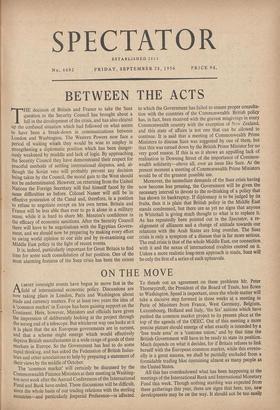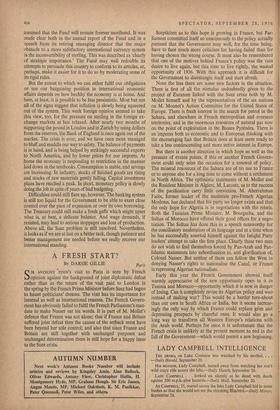ON THE MOVE
ALMOST overnight events have begun to move fast in the field of international economic policy. Discussions are now taking place in London, Paris and Washington about trade and currency matters. For at least two years the idea of a 'common market' in Europe has been gaining support on the Continent. Here, however, Ministers and officials have given the impression of deliberately looking at the project through the wrong end of a telescope. But whichever way one looks at it it is plain that the six European governments are in earnest, and that a scheme might emerge which would effectively deprive British manufacturers in a wide range of goods of their markets in Europe. So the Government has had to do some rapid thinking, and has asked the Federation of British Indus- tries and other associations to help by preparing a statement of their views by the middle of October.
The 'common market' will certainly be discussed by the Commonwealth Finance Ministers at their meeting in Washing- ton next week after the Annual Conferences of the International Fund and Bank have ended. These discussions will be difficult, since the whole basis of our trading relations with the sterling countries—and particularly Imperial Preference—is affected. To thrash out an agreement on these problems Mr. Peter Thorneycroft, the President of the Board of Trade, has flown to Washington. Speed is important, since the whole matter will take a decisive step forward in three weeks at a meeting in Paris of Ministers from France, West Germany, Belgium, Luxembourg, Holland and Italy, 'the Six' nations which have pushed the common market project to its present place at the top of the agenda of the OEEC. Out of this meeting a more precise picture should emerge of what exactly is intended by a `free trade area' or a 'customs union,' and by that time the British Government will have to be ready to state its position. Much depends on what it decides, for if Britain refuses to link herself with the European common market, while this eventu- ally is a great success, we shall be partially excluded from a formidable trading bloc containing almost as many people as the United States.
All this has overshadowed what has been happening at the meetings of the International Bank and International Monetary Fund this week. Though nothing startling was expected from these gatherings this year, there are signs that here, too, new developments may be on the way. It should not be too easily assumed that the Fund will remain forever moribund. It was made clear both in the annual report of the Fund and in a speech from its retiring managing director that the major obstacle to a more satisfactory international currency system is the inconvertibility of sterling. This was described as 'clearly of strategic importance.' The Fund may well redouble its attempts to persuade this country to conform to its articles, or, perhaps, make it easier for it to do so by moderating some of its rigid rules.
But the extent to which we can either fulfil our obligations or use our bargaining position in international economic affairs depends on how healthy the economy is at home. And here, at least, it is possible to be less pessimistic. Most but not all of the signs suggest that inflation is slowly being squeezed out of the system. This week foreign opinion seemed to take this view, too, for the pressure on sterling in the foreign ex- change markets at last relaxed. After nearly two months of supporting the pound in London and in Zurich by using dollars from the reserves, the Bank of England is once again out of the market. The crisis is over, and we have once more managed to bluff and muddle our way to safety. The balance of payments is in hand, and is being helped by strikingly successful exports to North America. and by lower prices for our imports. At home the economy is responding to restriction in the manner laid down in the textbooks. Consumption is stable, and savings are increasing. In industry, stocks of finished goods are rising and stocks of raw materials gently falling. Capital investment plans have reached a peak. In short, monetary policy is slowly doing the job in spite of years of bad budgeting.
Difficulties could still flare up, however. The banking system is still too liquid for the Government to be able to exert close control over the pace of expansion or over its own borrowing. The Treasury could still make a fresh gaffe which might upset what is, at best, a delicate balance. And wage demands, if resisted, may lead to serious stoppages and loss of production. Above all, the Suez problem is still unsolved. Nevertheless, it looks as if we are at last on a better tack, though patience and better management are needed before we really recover our international standing.



































 Previous page
Previous page